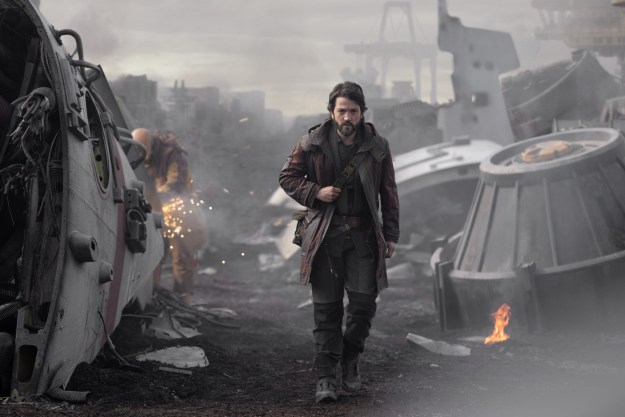Star Trek: The Next Generation debuted in 1987 to a great deal of skepticism. Throughout the run of the original series and its revival on the big screen, Star Trek had always been the story of Captain James T. Kirk, Mr. Spock, and Dr. McCoy, maverick space explorers portrayed by William Shatner, Leonard Nimoy, and DeForest Kelley. Now, with the film franchise in decline, creator Gene Roddenberry was proposing a new version of the beloved sci-fi series that would feature none of the familiar cast or characters. In an era before spin-offs and reboots ruled Hollywood, this was practically heresy. These doubts were further fueled by the unfortunate reality that, for its first two seasons, The Next Generation wasn’t very good, hampered by nonstop backstage drama.
- 11-9. The Best of Both Worlds, Parts I and II/Family (season 3, episode 26/season 4, episodes 1 and 2)
- 8 and 7. Chain of Command, Parts I and II (season 6, episodes 10 and 11)
- 6. Who Watches the Watchers (season 3, episode 4)
- 5 and 4. All Good Things … (season 7, episodes 25 and 26)
- 3. Darmok (season 5, episode 2)
- 2. The Inner Light (season 5, episode 25)
- 1. The Measure of a Man (season 2, episode 9)
The show’s fortunes changed significantly with its third season and the addition of new head writer Michael Piller, who rapidly retooled The Next Generation into a more contemporary sci-fi drama that would not only live up to the legacy of Star Trek but define it for the next 30 years. Piller’s TNG would become the launchpad for the Star Trek franchise’s most prosperous and prolific period, with a string of spin-offs that continues to this day. This writers’ room was the incubator for the next wave of space sci-fi on television, where the likes of Ronald D. Moore (Battlestar Galactica, For All Mankind), Brannon Braga (The Orville), and Naren Shankar (The Expanse) began their careers. Far more than an attempt to recapture the magic of the classic Star Trek, The Next Generation became one of the most iconic and influential science fiction series of all time, producing many of the franchise’s greatest episodes.
11-9. The Best of Both Worlds, Parts I and II/Family (season 3, episode 26/season 4, episodes 1 and 2)

After building momentum with the public throughout its redemptive third season, Star Trek: The Next Generation hooked audiences for good with a shocking cliffhanger that had fans shaking with anticipation throughout the summer hiatus. The Best of Both Worlds depicts the long-awaited return of the Borg, the unstoppable cybernetic zombies introduced in season 2’s Q Who? episode. As promised, they’ve come to conquer the Federation’s worlds and assimilate their technology, but there’s an even more sinister twist: they capture the Enterprise’s Captain Jean-Luc Picard (Patrick Stewart) and force him to lead their invasion. Wired into the Borg’s hive mind, Picard gives the collective the benefit of his decades of experience as a Starfleet officer and every advantage they’ll need to run roughshod through Earth’s defenses. At the end of Part I, stalwart first officer Commander William Riker (Jonathan Frakes) has no choice but to open fire on the Borg ship, potentially killing his friend and mentor.
If the conclusion to The Best of Both Worlds was as killer as its setup, it might have very well jumped to the top of this list, but Part II is a bit of an anti-climax. (This is because Piller and Company came up with the cliffhanger without any idea of how they were going to resolve it after their spring break, a habit they maintained for all of TNG’s season finales.) However, the uneven The Best of Both Worlds Part II is redeemed by the following episode: its informal epilogue, Family. For the first time in the series’ history, The Next Generation dedicated an entire episode to managing the fallout from the last one, and it hammers home exactly why The Best of Both Worlds and TNG as a whole have endured in the zeitgeist. Patrick Stewart’s performance as an emotionally reserved man coming to grips with the trauma of his capture is some of his finest work and provides an understanding of his character that influenced decades of stories that followed.
8 and 7. Chain of Command, Parts I and II (season 6, episodes 10 and 11)
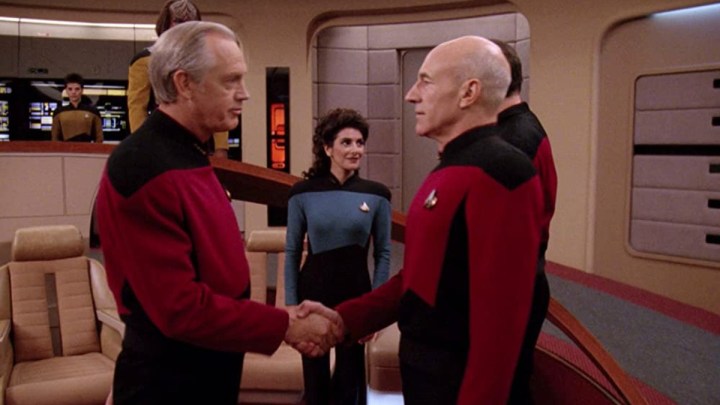
Another feature-length acting showcase for Patrick Stewart, Chain of Command sends Captain Picard on a covert mission to sabotage a Cardassian bio-weapon. Eventually captured and charged with terrorism, Picard engages in a fierce and cerebral battle of wills with a hardened interrogator (three-time Trek guest star David Warner). Like The Best of Both Worlds and Family, Chain of Command puts Picard through hell, but where those episodes explore his human frailties, Chain of Command showcases his incredible inner strength. Above all, however, Picard’s journey in this two-parter acknowledges that no amount of willpower makes you immune to the cruelty and indignity of torture.
Meanwhile, on the Enterprise, Commander Riker and the rest of the crew are facing their own stubborn adversary, their new Captain Edward Jellico (RoboCop’s Ronny Cox). After five years of growing together as a family, Riker and company find themselves with a mean new dad who’s willing to sacrifice their old one if it means keeping the upper hand in the Federation’s negotiations with the Cardassians. Jellico is a great secondary antagonist for this episode, but as abrasive as he is, fans have spent decades debating whether Jellico is the worst Captain of the Enterprise or one of the greatest.
6. Who Watches the Watchers (season 3, episode 4)
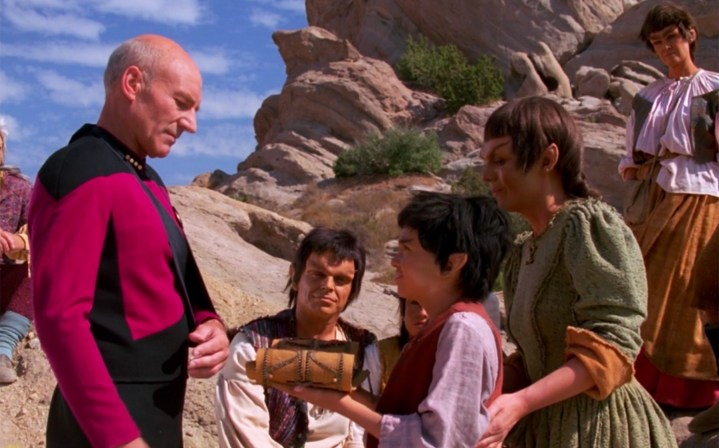
We love when Star Trek is a rollicking space adventure or a riveting political thriller, but at its heart, Star Trek is a Philosophy 101 course, Bible stories for the agnostic. The crew of the Enterprise, who represent the best of humanity, arrive at a new place where they must tackle some sort of moral dilemma and spark a conversation for the viewers at home. Who Watches the Watchers is a perfect example of this classic episode format. Here, while rescuing a secret Federation survey team on a planet in its Bronze Age of development, Picard accidentally becomes a religious figure in the eyes of its inhabitants. A simple misunderstanding quickly snowballs out of control, potentially condemning an otherwise peaceful society to generations of holy war. In order to prevent a bloodbath, Picard must find a way to debunk his own godhood. But of course, there’s only one surefire way to prove your mortality …
Underneath some solid character drama, Who Watches the Watchers is a study on the nature of faith, superstition, and extremism, but also on the value of history and anthropology. The Federation studies other cultures in part to gain a better understanding of themselves, to celebrate their differences as well as the things that bind all civilizations together. But, above all, this episode is a perfect encapsulation of Star Trek’s brand of humanism. While perhaps a bit harsh on the concept of religion overall, Trek’s message is that human beings are capable of making our own miracles through science and cooperation. We are, today, the gods that our ancestors worshipped, and in the future, we may yet become that which we now idolize.
5 and 4. All Good Things … (season 7, episodes 25 and 26)

In the two-hour series finale of Star Trek: The Next Generation, Captain Picard finds himself unstuck in time, bouncing back and forth between the show’s present, the Enterprise’s maiden voyage, and a lonely future 25 years hence. Only by finding clues in all three eras can he prevent the destruction of all life in the galaxy, not just in the present but throughout all time. It’s a climactic showdown between Picard and Q (John de Lancie), an omnipotent extra-dimensional being who has been Picard’s nemesis since the very first episode, but who is also sort of a member of the family. Their scenes together in this finale are among their best in the series.
An antecedent to the kind of fan service that has become absolutely exhausting in the ensuing decades, All Good Things … is an emotional ride that captures the essence of the entire series, celebrating each main character’s growth while delivering a fun and exciting high-stakes adventure. Though the episode definitely plays a bit better if you’ve also seen the series premiere, Encounter at Farpoint (warning: it’s bad), the episode still stands perfectly well on its own and holds up as one of the best TV finales of the 1990s. And, despite being followed up by four feature films and a reunion season on Star Trek: Picard, All Good Things… remains the only finale The Next Generation has ever needed.
3. Darmok (season 5, episode 2)

In this episode, Captain Picard finds himself trapped on a planet with the alien Captain Dathon (Terminator’s Paul Winfield) with whom he shares no common framework for communication. Even the Universal Translator, which usually makes any language instantly understandable, is useless because just transcribing his words isn’t enough. Dathon’s people speak only via allusions to their own mythology, all of which is Greek to Picard. While their ships butt heads up in orbit, Picard must find a way for himself and his counterpart to understand each other before they’re both killed by the planet’s indigenous wildlife.
Some fans might be perplexed by the placement of Darmok this high on our list of The Next Generation’s greatest episodes. After all, in many respects, it’s a very typical episode of the series, with no major impact on the Star Trek universe or deviations from the show’s established format. That, to our reckoning, is exactly why it deserves a place in our countdown: Darmok is the Platonic ideal of a Star Trek episode. Most Treks, particularly in The Next Generation, are not epic in scope or galactic in scale; They’re small but compelling dramas about peace, communication, and curiosity.
Of the 800+ episodes that have aired since 1966, there is no single, self-contained story that better represents what Star Trek is than Darmok. It’s thoughtful, it’s hopeful, and it’s also pretty silly. It’s a story about how connecting with someone different from you requires effort and patience but is one of the most important and rewarding things that a person can do. And, its value as an allegory about cultural context and the specificity with which people frame their world through language has only increased as our own civilization depends more and more on reaction GIFs and pop culture references to communicate.
2. The Inner Light (season 5, episode 25)
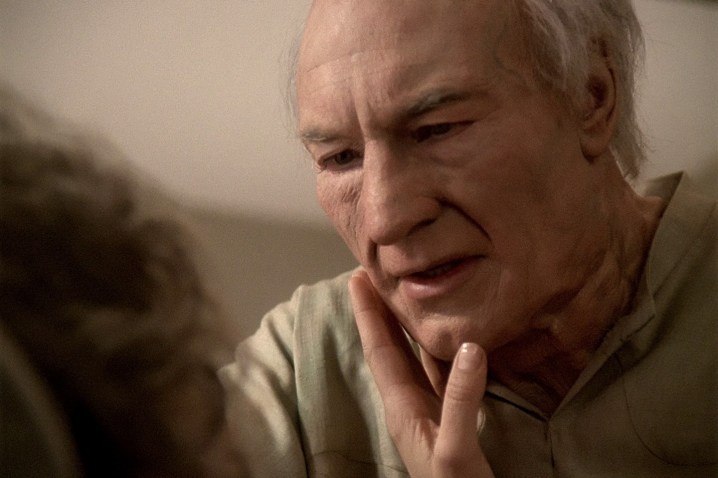
As evidenced by previous entries on this list, Star Trek: The Next Generation is often at its best as a spotlight for Shakespearean actor Sir Patrick Stewart as Captain Jean-Luc Picard. Stewart lent a degree of gravitas and legitimacy to every episode, but once or twice a season, the writers gave Stewart an opportunity to really show off the depth and range of his craft and of his character. In The Inner Light, a mysterious space probe psychically tethers itself to Captain Picard, causing him to collapse on the bridge of the Enterprise. While the crew attempts to revive him, we see a parallel story in which Picard wakes up on an unfamiliar, pre-warp planet, where he is greeted by a wife and a community of friends. Unable to leave the planet or convince anyone that his life as a space explorer wasn’t a dream, Picard — or, Kamin, as he’s called here — has little choice but to make a home for himself on this new world over the course of the following decades. You read that right, we said “decades.”
Beyond the mystery of what has happened to the captain, The Inner Light offers a deep exploration of Picard as a character. Throughout the series, Picard has been depicted as an emotionally reserved loner whose unhappy upbringing dissuaded him from starting a family. He has difficulty expressing affection or building romantic attachments, he’s uncomfortable around children, and he’s always chosen his career over his personal life. Now, suddenly, that career is gone, and he has the opportunity to learn what else he could be. Who is Jean-Luc Picard, if he’s not a space explorer? The Inner Light is a beautiful, heartbreaking story about the simple and undeniable beauty of everyday life, wrapped in a digestible hour of sci-fi television.
1. The Measure of a Man (season 2, episode 9)
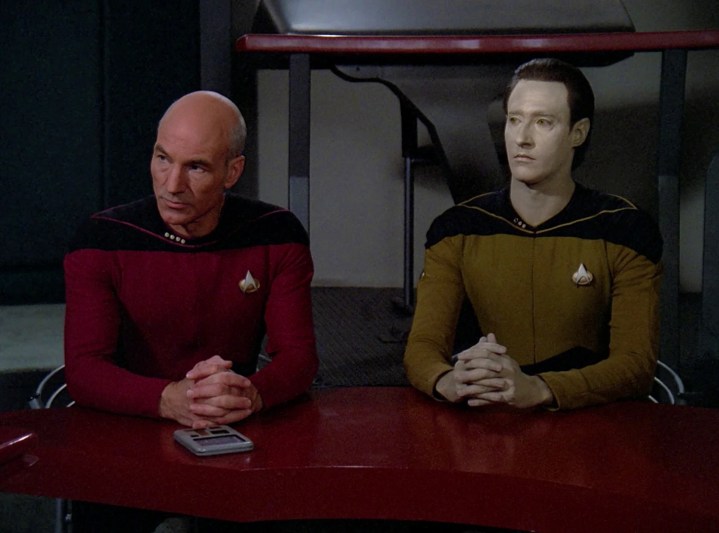
While The Next Generation doesn’t become week-to-week great TV until its third season, there are still a few diamonds in those rough first two years, including the show’s finest hour. In The Measure of a Man, Starfleet cyberneticist Bruce Maddox (Brian Brophy) proposes dismantling the android Lt. Commander Data (Brent Spiner) so that he can be studied and mass-produced. When Data refuses to participate, Maddox argues that, as a machine, Data has no legal standing and is the property of Starfleet. This escalates into a courtroom drama, with Captain Picard advocating for Data’s personhood and Commander Riker forced to serve as Maddox’s counsel. The first screen credit for attorney-turned-author Melinda M. Snodgrass, The Measure of a Man is the finest example of Star Trek as a Socratic argument, talking through the finer points of sentience and artificial intelligence in a way that has never felt more relevant.
But, as always, the sci-fi of a great Star Trek episode isn’t really about sci-fi. The Measure of a Man does what Trek does best, using the imaginary problems of the future to recontextualize a familiar issue of our past or present. The Measure of a Man isn’t about robotics or artificial intelligence, it’s about the ease and frequency with which those in power justify the exploitation of those less powerful. Throughout history, those with the means to do so have found excuses to dismiss the rights of others for their own gain. In the real world, these atrocities take centuries to overcome, and never without bloodshed. The utopian future of Star Trek allows us to imagine that the next such tragedy can be averted by taking a hard look at our past, at each other, at ourselves, and saying “Not this time.”
All seven seasons of Star: Trek The Next Generation can be streamed on Paramount+.
Editors' Recommendations
- 10 best sci-fi movies of 2023, ranked
- 7 best SNL holiday skits, ranked
- Who is the best Harley? All the Harley Quinns, ranked
- At SDCC, Strange New Worlds goes full musical and more Star Trek trailers
- All The Purge movies, ranked from worst to best



